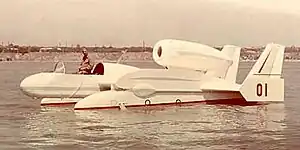| Be-1 | |
|---|---|
 | |
| Role | Experimental Wing-In-Ground-effect vehicle |
| National origin | Soviet Union |
| Manufacturer | Beriev |
| Designer | Robert Ludvigovich Bartini |
| First flight | 1964 |
| Number built | 1 |
The Beriev Be-1 was an experimental wing-in-ground-effect aircraft developed in the Soviet Union during the 1960s.
Design and development
In 1956, Robert Ludvigovich Bartini approached the Beriev design bureau with a proposal for a Wing-In-Ground-effect vehicle (WIG). The Be-1 became the first experimental prototype, used for exploring the stability and control of wing-in-ground-effect aircraft.
The Be-1 featured two floats with very low aspect ratio wing sections between them and small normal wing panels extending outside the floats. Surface-piercing hydrofoils were mounted on the underside of the floats. The aircraft was powered by a single Tumansky RU-19 turbojet, mounted above the wing. The Be-1 was also equipped with landing gear. The aircraft was operated between 1961 and 1964. The first flight from water was made in 1964.[1][2]
See also
Related development
Related lists
References
- ↑ "Beriev Be-1". Archived from the original on 2016-03-03. Retrieved 2008-08-10.
- ↑ "Beriev Aircraft Company - Photos". Archived from the original on 2013-10-17. Retrieved 2008-08-10.